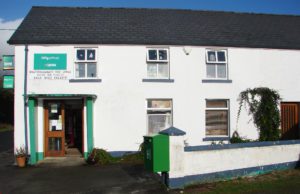Green shoots in rural Ireland?

While the economy appears to be looking up in cities, retailers in rural areas are still feeling the pinch as optimism and investment doesn’t quite make it as far as it might. Doug Whelan speaks to one store owner still facing an uncertain future, and learns about RGDATA’s comprehensive plan to kick-start local economies
15 March 2017

Brendan Mannix owns a modest shop and post office in Ballymceligott, Co. Kerry
 In our roles covering Ireland’s grocery industry at ShelfLife, we speak to retailers up and down the country constantly. Being in the same industry, selling the same products and subject to the same regulations, it should come as no surprise that these small business owners almost invariably bear the same concerns. Licensing rates, crime, prohibitive banking charges, the Alcohol Bill and ever-growing local competition always come up, be it in Dublin, Donegal, Kilkenny or Killarney.
In our roles covering Ireland’s grocery industry at ShelfLife, we speak to retailers up and down the country constantly. Being in the same industry, selling the same products and subject to the same regulations, it should come as no surprise that these small business owners almost invariably bear the same concerns. Licensing rates, crime, prohibitive banking charges, the Alcohol Bill and ever-growing local competition always come up, be it in Dublin, Donegal, Kilkenny or Killarney.
A glance at newspaper headlines over the past couple of years would have us believe that the economy is in rude health, and optimism is rife. In Dublin, the city’s skyline is packed with cranes once again as ambitious construction projects kick off and foreign investors arrive at the airport with deep pockets and big plans. Some (not all, but some) retailers are in the midst of large-scale revamps, while new state-of-the-art stores pop up almost weekly.
Rural economy
Keeping that glorious sight in mind, the topics we mention above aren’t the only ones that come up among retailers. The booming economy has not and arguably will not for some time reach towns and villages in the west and south of Ireland. The types of places that lost wave after wave of young people to Dublin, London and Sydney during the recession and are unlikely to get them back.
Add in the intense competition between multiples that is draining customers, and grocery stores in smaller towns and villages are being left behind; just as those towns and villages are themselves.
It’s a complicated problem with many layers, causes and effects. To learn more about it, we spoke to Dermot Mannix, who runs Mannix’s in the small village of Ballymceligott in Kerry. Formerly a Centra store and now an independent, Mannix broke down for us the challenges of running a business in an area such as his.
“One of the scarcest commodities we have is people,” he explained over the phone while working away in the store. “The young people are few and far between. That’s not to say they’re gone completely, but a good 70% have moved elsewhere. They do come sporadically, but there’s certainly very little work for them.
“For example,” he says, “there’s a fella who is an electrician. He does some work around the area, but also he’d be back and forth to the UK and he’d be gone for a month at a time.”
Family business
Mannix himself is a returned emigrant. After living in London since the late 1980s, he returned to Kerry in 2003 to start a family and take over the family business which had been in operation for more than 50 years. But, he adds, family business or not, there is little in the area that will raise the population any time soon.
With a dwindling local population, it becomes harder and harder for a convenience store to make ends meet, either in Ballymceligott or the larger towns surrounding it.
“I was in Tralee recently and it’s not exactly thriving there,” he says. “Listowel and Killarney would be a little bit better.”
Vacant units
The main issue – as we learned from RGDATA’s Tara Buckley below – is that these local areas do not have sufficient investment in other businesses to create footfall for the likes of Mannix’s. Empty retail units can be found in abundance in every town and village, and getting these occupied is one of the keys to securing a future for struggling stores.
“When I was a kid here,” he says, “we used to open the door in the morning and there’d be 120 farmers waiting; they’re just not there anymore.”
However, Mannix says that he does have some options for the future of his store. “I’ve been on the lookout for a new site on the N21,” he says, “to move the business to. I honestly thought I could be out of here a couple of years ago. It doesn’t need to have a forecourt, just somewhere that could attract passing trade.”
Without that, he admits that Mannix’s food store may have reached the end of its life. “I don’t see any future in this business for my own kids,” he says matter-of-factly. “If we found a new site that would be something to work with and grow. But if I thought one of them was going to stay home to run the business as it is now, I’d close it before I let them do that.”
A healthy town is a busy town
With her usual passion and command of the issues, RGDATA’s Tara Buckley is all-too familiar with the plight of stores like Brendan Mannix’s, and has a plan to help rural areas get their spring back

RGDATA’s Tara Buckley says joined-up thinking is needed to breathe life into Ireland’s towns and villages
We spoke to Tara Buckley and Brendan Mannix on the same day earlier this month, and it was remarkable how much their comments matched up regarding the issues facing small towns and retailers. “Over the years,” she says, “groups come together to work out how they can regenerate their towns. Enthusiastic groups do come together and make things happen, whether it’s a local festival, a market or some other event.
“Those things work when they’re done,” she says, “but when things get back to normal, the old problems remain. There are few lasting results, and people get disillusioned.”
This is the very issue Brendan Mannix described, when he told us about a mooted “National Post Office Week” at which he was less than impressed.
Identifying broader issues
Buckley, who was awarded the Convenience Champion 2017 award at the recent ShelfLife C-Store Awards, says they realised that instead of short-term solutions, it was key to identify the broader issues facing towns and villages. As such, the Town Centre Health Check project was developed by RGDATA in conjunction with the Heritage Council, along with the input of several expert groups and the assistance of educational institutions.

Tara Buckley accepts the Convenience Champion 2016 award from ShelfLife publisher John McDonald with RGDATA president Colin Fee
“Instead of one-off plans,” Buckley explains, “these areas need what we call ‘health checks’, which is at its heart a large collection of surveys based on existing international best practice that offers a snapshot of a town as it exists, and eventually highlights whatever issues that town might be facing.”
To carry out a health check, a group maps the town centre, maps its usage, surveys and itemises what stores and businesses exist within a certain radius. Every element that contributes to the town’s services and society is taken into account – parking, accommodations, second-level amenities, green space, the lot. Residents and visitors are then surveyed on their uses and opinions of the town, to give a picture of the type of footfall it sees.
Town Centre Health Checks
“By doing a Town Centre Health Check like this,” Tara Buckley explains, “things will begin to emerge. When you’ve finished the work you’ll have a picture of the town and the issues. The next step then is to sit down with a Town Team and devise a plan on how the town should move forward.”
One town may need to improve its retail offering to bring in visitors and residents. Another may need to look at its access to parking, or its pedestrian access or one of a multitude of elements in order to give the town a shot in the arm.
Tara Buckley says that the problems facing small towns and villages in rural Ireland are complex ones that require “joined-up thinking and a strategic approach. Lobbying on the issue has led to the original pilot scheme looking at ten towns to be expanded nationwide by the Department of Rural and Gaeltacht Affairs and Heritage, led by Heather Humphries, TD.
“We’re delighted that the government has seen this is the way to go,” Buckley says. “The next step is we believe that programme should have a centralised office, along with legislation compelling towns to take the test. After that, we’ll be doing really well.
To learn more about the Town Centre Health Check programme, visit www.rgdata.ie.



 Print
Print



Fans 0
Followers